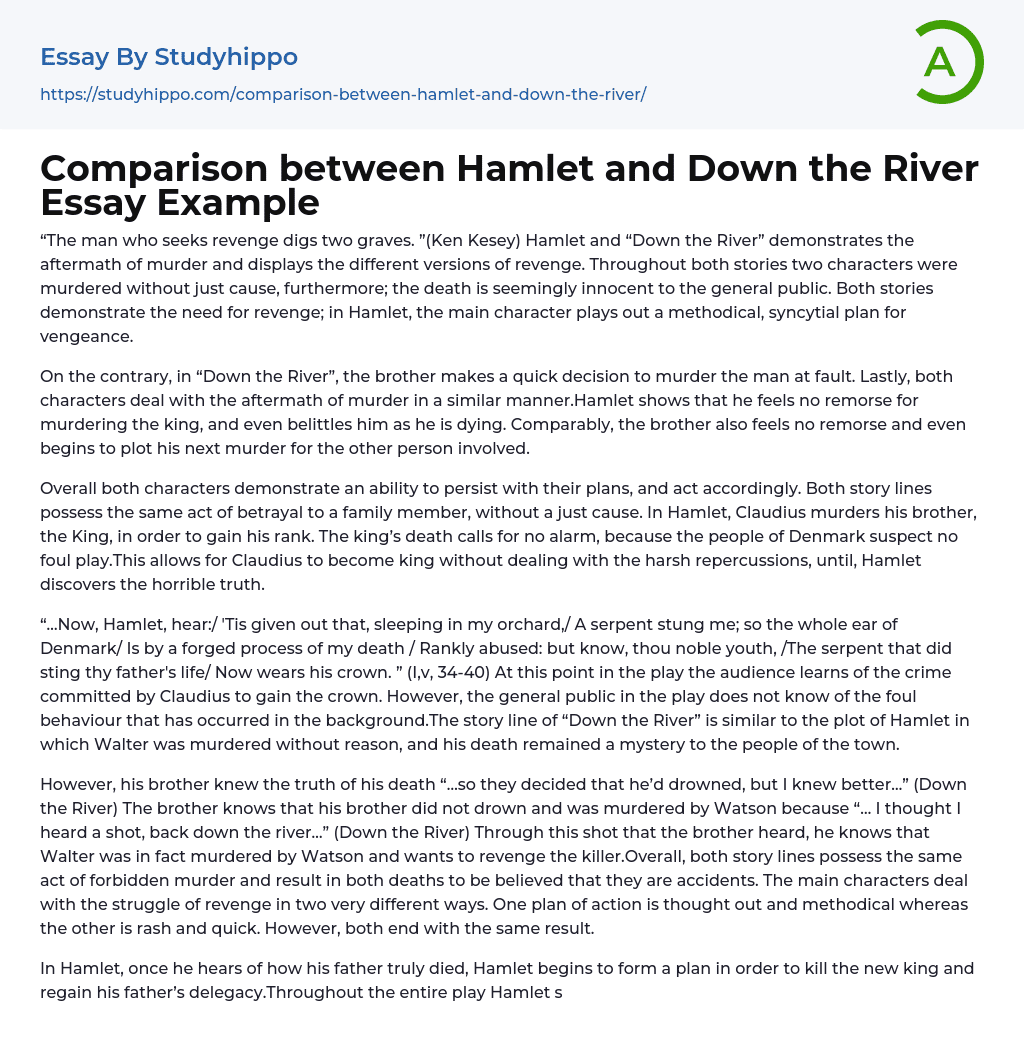

Comparison between Hamlet and Down the River Essay Example
"The man who seeks revenge digs two graves." (Ken Kesey) The stories of Hamlet and "Down the River" showcase the consequences of murder and portray varying approaches to seeking revenge. In both tales, two characters are unjustly killed, though the deaths may appear innocent to outsiders. The narratives highlight the desire for retribution, with Hamlet meticulously plotting his revenge.
Contrarily, the brother in "Down the River" promptly chooses to kill the responsible individual, while Hamlet exhibits no regret for murdering the king and mocks him as he dies. Additionally, both characters handle the consequences of the killings similarly, with the brother lacking remorse and planning further murders involving others concerned.
In general, both characters exhibit determination and appropriate behavior in pursuing their goals. The two plots share a common event
...of familial betrayal without legitimate reason. In Hamlet, Claudius kills his brother, the King, to seize power. The public does not suspect foul play upon the king's death, allowing Claudius to ascend the throne without consequences until Hamlet uncovers the gruesome truth.
The audience learns in Act I, Scene V of Hamlet that Claudius gained the crown through a deceptive process, using the analogy of a serpent stinging the former king. However, this fact remains unknown to the public within the play. Similarly, in "Down the River", Walter's murder is left unexplained and unknown to the town, mirroring the plot of Hamlet.
Both "Down the River" and another story deal with the theme of mistaken murder. The protagonist in "Down the River," suspects that Watson shot his brother instead of drowning him, leading to a desire for revenge that is impulsively pursued. Similarly,
characters in the other story also face a desire for revenge but follow a more methodical approach. Despite these differences, both stories ultimately reach the same conclusion.
In order to avenge his father's death, Hamlet comes up with a plan to kill the new king and take back what rightfully belongs to his father. However, he struggles throughout the play to figure out his next move and gather proof of Claudius's involvement in the murder. Eventually, Hamlet decides on staging a play that will depict events related to his father's death and judge Claudius's reaction. He proclaims that he will keep a close eye on Claudius's response during the performance, saying "For I mine eyes will rivet to his face, /And after we will both our judgments join /In censure of his seeming" (III, ii, 85-87). This means that he will carefully observe Claudius and decide whether or not to carry out his revenge based on how he reacts.
Hamlet had difficulty deciding what to do despite being confronted with a situation that required action. His well-known soliloquy, "To be or not to be: that is the question" (III, I, 56), demonstrates his hesitation about whether or not he should murder the king. In contrast, the brother in "Down the River" acted quickly following Watson's unpunished killing of his sibling. However, this impulsive plan revealed his insufficient reflection and decision-making abilities.
The main contrast between the lyrics of "Down the River" and Hamlet is in their respective approaches to seeking revenge for a loved one's death. While the protagonist in "Down the River" takes quick and decisive action by hiding in the woods and shooting his brother's killer,
Hamlet meticulously plans out his actions. Essentially, the difference lies in how each character executes their plan.
Both characters, Hamlet and the brother in “Down the River”, deal with the aftermath of killing their enemies in a similar way. Hamlet kills Claudius with intense anger and shows no remorse for his actions. In fact, he makes sure that Claudius suffers a slow death by poisoning him after stabbing him and says, “Here, thou incestuous, murderous, damned Dane” (V,ii,325). Hamlet’s sole purpose is to avenge his father’s death and he does it without mercy. Similarly, the brother in “Down the River” also shows no emotion after killing Watson. He describes the act as chaining him to an anvil and letting him go, without telling anyone for five years.
(Down the River) The brother expresses his lack of regret and ability to keep his decision to himself without succumbing to pressure. He later insinuates a plan to kill Wilson's cousin as he was involved in Walter's murder. Both characters effectively carry out their plans without remorse. Hamlet and the Brother both have experienced foul play resulting in the murder of a family member.
Despite their differing approaches, what distinguishes Hamlet and his brother is their shared desire for revenge. While Hamlet relies on intellect and cunning, his brother acts impulsively. The aftermath of their respective killings brings them back together, with neither expressing remorse and both taking satisfaction in their deeds. All in all, this illustrates how evil actions can be plotted from any mindset.
- Hamlet Madness essays
- Prince Hamlet essays
- Absolutism essays
- Appeal essays
- Bourgeoisie essays
- Contras essays
- Corporate Governance essays
- Corruption essays
- Democracy essays
- Democratic Party essays
- Developed Country essays
- Dictatorship essays
- Elections essays
- European Union essays
- Federalism essays
- Foreign essays
- Foreign policy essays
- Gentrification essays
- Hillary Clinton essays
- Income Tax essays
- International Relations essays
- John Marshall essays
- John Stuart Mill essays
- Left-Wing Politics essays
- Liberty essays
- Military essays
- Monarch essays
- Monarchy essays
- Political Corruption essays
- Political Party essays
- Political Science essays
- President Of The United States essays
- Public Service essays
- Red Cross essays
- Reform essays
- Republic essays
- Revenge essays
- Social Security essays
- Sovereign State essays
- State essays
- Supply essays
- Terrorism essays
- United Nations essays
- World Trade Organization essays



